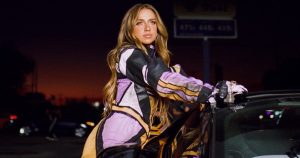Rock artist gains fame on TikTok
Beabadobee releases debut album after much anticipation from fan base on social media
October 22, 2020
Beatrice Laus of Beabadoobee released her much awaited debut album, Fake It Flowers, on Oct. 16. I first heard about her when she was touring with Clairo last year, then on the backs of two EPs made with Dirty Hit Records London, she dropped her third EP shortly after.
These early songs served to solidify her as one of the many lo-fi bedroom acts of the late 2010s. Since the tour she’s hit mainstream success with her song “Coffee” that Powfu remixed into “death bed (coffee for your head)” which reached TikTok virality this year. But beyond these early EPs, a TikTok moment and an international tour, there was always a pulling feeling that she had potential to reach beyond, as if she was a flashing pang that might continue to burn upon touch far beyond these early successes.
Feeling out her sound, she has finally put together her debut album, an impressive collection with a coherence that takes a listener back to the days when making music was with the expressed purpose to be consumed as an album. Her self described “bubblegum grunge” allows her silky voice to ride high over heavy guitars, and her nods to late 1990s alternative rock powerhouses like Karen O give the album a weight unlike other comparable musicians of the age.
The album starts with two heavy hitters I feel best encapsulate the uniquely girly strain of alternative rock that Laus is getting at. “Care” and “Worth It” both enlist an upbeat Y2K-era pop punkish riff that gives way for her sweet voice to take you along the thralls of late adolescent emotional arcs. An early 2000s movie title sequence pops immediately into one’s head at the sound, and yet there is such a cool factor that cuts through her obvious nods to the past. “Charlie Brown” illustrates a flirtation with a harder rock edge that, though still approachable, allows a listener to glean some genuine pain off the reverberations. And yet there is still “Sorry” that has the softer lullings one would accompany with the dream pop of the day. It is in this that Laus steps in as liaison between the dreamy softenings of lo-fi and the more blistering iterations of rock. She does well in that space.
It’s a great deal more gripping than some of her compatriots in the indie space and establishes herself in another realm entirely. Her nods to influences are much more explicit, she is not afraid to tap into the realm of heavier rock, and this confidence is what makes her music work. She isn’t reinventing rock-n-roll, but she is allowing herself to allude directly to it.
To look in its eyes and claim some part of it for herself. I feel as though other young artists might be scared to dip their toes into something beyond a sincere yet simple lyrical composition, guitar, and catchy synth. It seems Laus is following an Eliot-esque thought — a good poet will imitate, but a great one will steal.
Instead of the endless reiterations of bedroom pop aesthetics that I’ve lamented in past articles, she shifts to a world ultimately more full of depth — good ol’ rock-n-roll. With this heightened field of poetic and sonic inspiration to pull from, she is capable of creating an album that means something beyond the ephemera. If not for anything besides the hope that a connective tissue might form between rock-n-roll of the past and where music is at right now.














